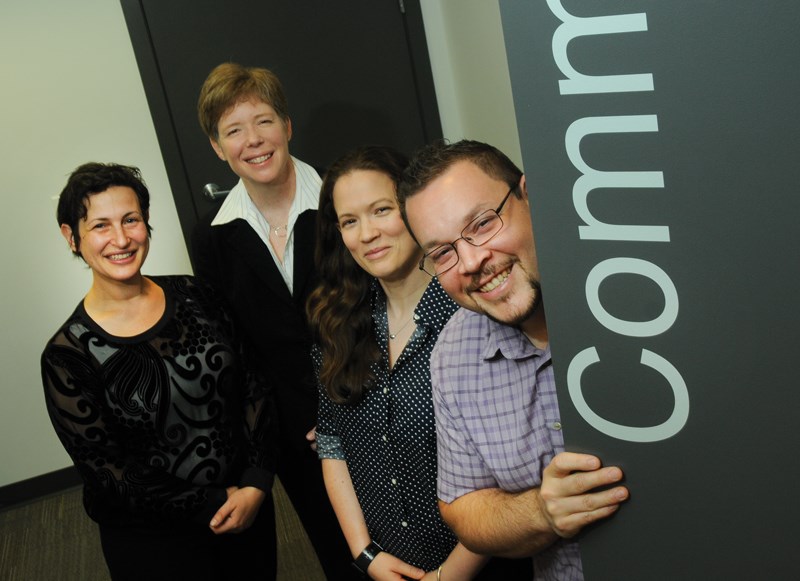Family Services of the North Shore is asking the public to weigh in to help the agency better serve members of the local LGBTQI2S community and their families, at times forced to navigate instances of stigma and discrimination, in an effort to help pave the way toward self-acceptance and community support.
While Family Services has long supported members of the LGBTQI2S community (an acronym for lesbian, gay, bisexual, transgender, questioning, intersex or two-spirit), its current initiative marks an attempt to formalize program offerings.
“Trans youth and their families have always been able to access the clinical services here at Family Services of the North Shore. But we recognize that we need to do more specialized services and to create awareness of these services,” says Julia Staub-French, executive director of Family Services of the North Shore.
For the project, the agency has partnered with Elisabeth Cooke, managing director of Inclusivity, a local company that provides diversity management and counsel to organizations, corporations and government.
Cooke has also been involved with the annual Diverse Genders and Sexual Orientation Conference presented by District of West Vancouver Youth Services, open to youth, family and professionals. The third annual edition is set for Sept. 30 to Oct. 2 at Gleneagles Community Centre.
“What that conference showed us was that across the North Shore there’s a lot of families and youth that are really looking for more information, more education and more support,” says Cooke.
With that need identified, Family Services, a North Shore-based not-for-profit community-based agency that offers clinical counselling, education and support services, quickly realized their potential to use their expertise to help close the gap.
“To do that we wanted to make sure that we are fully competent at every level of the organization to support trans youth and their families when they come in the door all the way through to services,” says Staub-French.
To that end, staff throughout the agency have undergone additional training, and they’re organizing two upcoming focus groups, one for LGBTQI2S youth and the other for their families, facilitated by Cooke, seeking to gather data, stories and insight that will be useful in the development of potential new programs.
“More often than not people are just provided with a buffet of what they can have and they don’t often get a choice or a say in the matter. … Any community advocate will tell you that those are the kinds of things that they want, that, ‘You need to ask us, you need to engage us in this discussion.’ And Family Services is certainly leading the way in doing that,” says Cooke.
A youth focus group for participants ages 13 to 18, is being held Wednesday, June 1, from 4 to 6 p.m., and a parent or guardian focus group is taking place Monday, June 6 from 5 to 7 p.m., both at Family Services of the North Shore.
Transgender identifying youth are statistically more vulnerable than other groups of youth by far, says Cooke. Last year’s Canadian Trans Youth Health Survey suggests some of the issues facing transgender identifying youth are as follows: 66 per cent reported discrimination, 70 per cent reported sexual harassment, 66 per cent reported self-harm and suicidal ideation, 30 per cent had attempted suicide and 70 per cent felt their families didn’t understand them.
“We are here for all children and youth for all of the issues. When we see and we understand that there’s a certain segment of our population on the North Shore and these children, youth and their parents are dealing with this, we need to be here for them. We cannot hear that 30 per cent of trans youth have attempted suicide and not do more to really help. We always have, but we need to make sure that we’re doing everything we can in support with our community,” says Staub-French.
The same survey also found that youth who had supportive adults in their lives were four times more likely to report good or excellent mental health. “We know statistically that youth that are supported and are cared for do better. So that’s the gap that we’re filling. We’re trying to grab all the kids that might not already be at Family Services and that could use those services, and the families that could use those services to help the parents be more understanding, to make those kids’ opportunities in life that much more fruitful,” says Cooke.
Based on the focus group feedback, new programming could be launched as early as this summer and into the fall.
“We really want to get the word out and be part of the conversation on the North Shore to say that this is an important issue. We need to do our part to ensure that (transgender youth) feel really safe in our community and when they reach out to us that they will feel very welcomed and it’s not an anxious place to come. They can come feeling very supported here by our entire agency. We really wanted to provide that leadership and actually to be a role model for other organizations on the North Shore,” says Staub-French.
Additional partners on the project include District of West Vancouver Youth Services as well as Telus, which has offered financial support.
To register for the focus groups, contact Elisabeth Cooke, at [email protected] or 778-231-2375. Info: familyservices.bc.ca.



